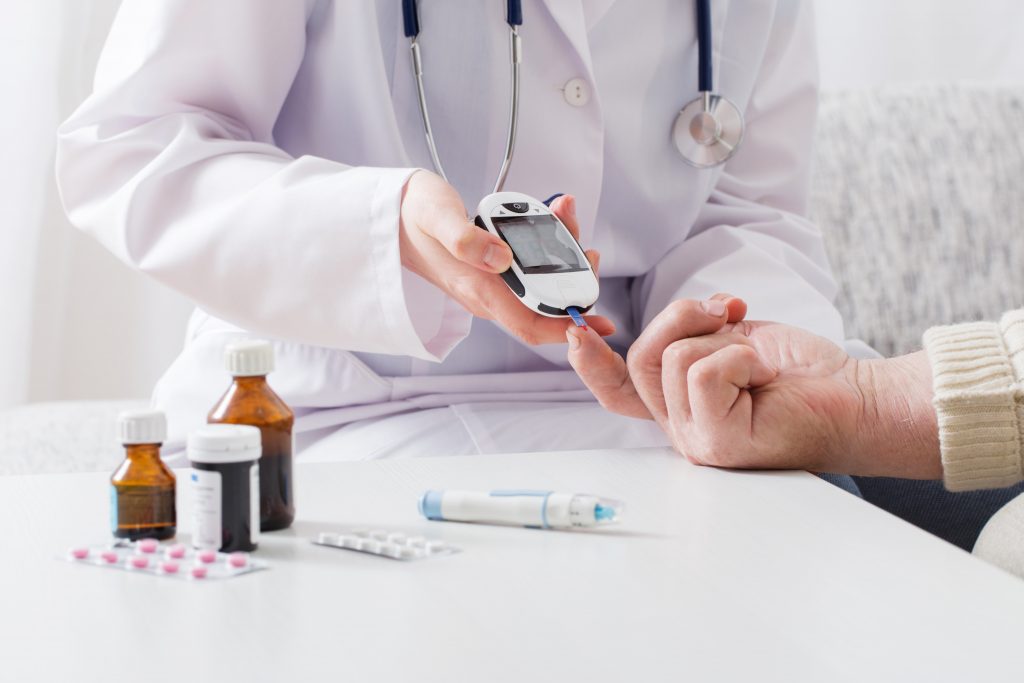May 13, 2021
How to Lower Blood Sugar Naturally
Keeping blood sugar levels in check reduces insulin resistance, weight gain, stress hormone levels, inflammation in the body, and decreases the incidence of Type 2 Diabetes Mellitus. Medications are often the first-line treatment for high blood sugar, but there are ways you can lower your blood sugar naturally and avoid having to manage one or more prescription medications for your condition. Blood sugar circulates in our blood stream to supply energy to cells in the body. Blood sugar levels need to be optimal and not too high. This can be also achieved naturally.
Dr. Maheswari Raja, a family medicine physician with Healthcare Associates of Texas located in Coppell says, “patients should see their physician at least once every three months and intermittently check their blood pressure with home monitors. If their blood pressure isn’t well controlled, or treatment is not optimized, patients will need to see their physician more often.”
Here’s how to check your blood sugar levels, and what you can do to reduce low blood sugar naturally.
What Are the Symptoms Of High Blood Sugar?
High blood sugar, also known as hyperglycemia, usually occurs when the body cannot use insulin properly or has extremely low levels of insulin. Insulin is the hormone responsible for moving glucose, or sugar, into the bloodstream where it can then be delivered to cells and used for energy. High blood sugar is usually associated with diabetes.
Symptoms of high blood sugar may include:
- Frequent urination
- Feeling thirsty all the time
- Increased hunger
- Headaches
- Blurred vision
- Feeling weak and tired
- Slow-healing wounds
- Weight loss
- Skin infections
- Vaginal/yeast infections
- Tingling and numbness in hands and feet
- Skin changes, such as blisters and dryness
- Swollen and bleeding gums
- Fruity-smelling breath
- Difficulty breathing
- Nausea and vomiting
- Confusion
- Abdominal pain
“Patients can have symptoms of headache and dizziness with high blood pressure, but patients can also be completely asymptomatic,” adds Dr. Raja.
How to Test Blood Sugar Levels
Your doctor can test your blood sugar levels using one of several methods depending on your unique health situation.
“We usually do a hemoglobin A1C test or check their serum glucose levels,” says Dr. Raja.
The most common testing method used is the glycated hemoglobin (A1C) test, which screens you for prediabetes, and diabetes.
The A1C test is a blood test that measures the percentage of blood sugar attached to hemoglobin. Hemoglobin is the protein in red blood cells responsible for carrying oxygen from your lungs to tissues in the body. The A1C test will reveal your average blood sugar level for the previous two to three months.
Certain health conditions such as severe anemia, vitamin deficiencies, thalassemia, and sickle cell trait can often result in inaccurate A1C test results. When A1C test results seem inaccurate or inconsistent, your doctor may perform one or more other tests. These include a random glucose test, a fasting glucose test, or an oral glucose tolerance test.
For the random glucose test, your doctor will take a sample of your blood at a random time to test your blood sugar level. A fasting glucose test requires you to do an overnight fast before your doctor draws blood the following day. The oral glucose tolerance test also requires you to do an overnight fast, and consume a sugary liquid after you arrive at the doctor’s office, and get blood drawn at one hour and three hour intervals.
What Is a Normal Blood Sugar Reading?
A normal blood sugar reading for the A1C test is 5.7%. Your doctor will diagnose you with prediabetes if your A1C is between 5.7% and 6.4%, or with diabetes if your A1C is 6.5% or higher.
If you take the random blood sugar test, you will be diagnosed with diabetes if your blood sugar level is 200 milligrams per deciliter (mg/dL) or higher.
Dr. Raja says, “A normal fasting blood sugar reading should be <200 mg/dL.”
A normal blood sugar reading for the fasting test is less than 100 mg/dL. A reading between 100 and 125 mg/dL may be diagnosed as prediabetes, and a reading of 126 mg/dL or higher may be diagnosed as diabetes.
If you take the oral glucose tolerance test, a normal reading is anything lower than 140 mg/dL. A reading between 140 and 199 mg/dL is prediabetes, and a reading of 200 mg/dL or higher is diabetes.
What Is Diabetes?
Diabetes is a chronic disease that develops when your blood sugar levels stay higher than normal because the body’s ability to use insulin well is impaired or because not enough insulin is made in the body to move glucose into the bloodstream so cells can use it for energy.
There are different types of diabetes: type 1, type 2, prediabetes, and gestational diabetes.
Type 1 diabetes is thought to be autoimmune in nature, where the immune system destroys the insulin making cells in the pancreas, which results in the body making little to no insulin. In type 2 diabetes, the pancreas makes insulin, but it is either not enough, or the body does not use the insulin well. Insulin resistance usually happens in fat, liver and muscle cells.
Prediabetes occurs when blood sugar levels are higher than normal, but not high enough to be diagnosed as type 2 diabetes.
“Prediabetes means an increased risk of progressing to type 2 diabetes. However, it can be reversed with lifestyle changes,” says Dr. Raja.
Gestational diabetes is diabetes that develops during pregnancy, which is thought to be caused by hormonal fluctuations that affect insulin production.
Diabetes is highly common in the U.S. and affects one in four people aged 65 years and older. Diabetes can often be effectively managed with a combination of medications and healthy lifestyle behaviors including exercise and nutrition.
Things That Cause High Blood Sugar
High blood sugar can be caused by a variety of factors. The most common factors that contribute to high blood sugar include:
- Overeating/eating large portion sizes
- Unhealthy diet/foods high in sugar, carbohydrates, and fat
- Low physical activity/sedentary lifestyle
- Side effects from certain medications, including antipsychotics and steroids
- Chronic stress
- Short-term stress, such as that caused by an overwhelming project at work
- Illnesses, such as the flu and common cold
- Short-term pain, such as that caused by an injury or sunburn
- Chronic pain, such as low back pain
- Menstruation
- Dehydration
- Poor diabetes medication management
- Using old, expired insulin
- Injecting insulin incorrectly
“Most patients with high blood pressure don’t have a known cause. This is called essential hypertension or primary hypertension,” Dr. Raja adds.
How to Reduce Your Blood Sugar Level Naturally
It’s possible to reduce your blood sugar level naturally without medication. However, you will need to make one or more significant lifestyle changes that promote better overall health and decrease insulin resistance or increase insulin sensitivity. Follow the below steps to lower your blood sugar naturally.
 Dr. Raja gives her five tips that can help reduce your blood sugar, “The first thing is to eat a low carb diet, low in starchy foods, highly processed foods or concentrated sugars. Second is to regularly exercise, a minimum of 30 minutes five days a week. The third way is to incorporate some form of strength conditioning, simple body weight exercises that help build muscle, since muscle decreases insulin sensitivity. The fourth way is intermittent fasting and the fifth is weight loss, even a few pounds. All these should help patients lower their insulin resistance, and lower their blood sugar naturally.”
Dr. Raja gives her five tips that can help reduce your blood sugar, “The first thing is to eat a low carb diet, low in starchy foods, highly processed foods or concentrated sugars. Second is to regularly exercise, a minimum of 30 minutes five days a week. The third way is to incorporate some form of strength conditioning, simple body weight exercises that help build muscle, since muscle decreases insulin sensitivity. The fourth way is intermittent fasting and the fifth is weight loss, even a few pounds. All these should help patients lower their insulin resistance, and lower their blood sugar naturally.”
Make Healthy Changes To Your Diet
The foods you eat have a major impact on the way your body uses insulin. Eating healthy foods like vegetables and whole grains and cutting out foods high in sugar and carbs can often help regulate your insulin and reduce your blood sugar levels.
Reduce Carb Intake
Reduce your intake of refined carbohydrates, as high levels of carbs can cause the pancreas to release higher amounts of insulin which eventually decreases insulin sensitivity in cell receptors. Examples of refined carbs to avoid include white bread, pastries (donuts, cookies, cakes), sodas, and many other processed foods. Limit your carb intake to complex carbs only (such as beans, whole grains, and sweet potatoes), which are higher in fiber and loaded with nutrients.
Eat More Fiber
Fiber should also be an essential part of your diet, as fiber slows the digestion of carbs. High-fiber foods include vegetables, beans, and whole grains and fruits.
Stay Hydrated
Drink plenty of water, as water reduces the risk of dehydration and helps flush out excess sugar and toxins that may be overloading your kidneys.
Water also helps regulate blood sugar levels. Aim to drink more water throughout the day, and replace sugary beverages such as sodas and fruit juices with water.
Avoid Sugar
Cut out sugary foods, as high sugar intake can overwork your kidneys and increase blood sugar levels. Candies, dried fruits, pastries, condiments, and processed foods are some of the many high-sugar foods that contribute to high blood sugar and diabetes. If consuming any sugar, limit your sugar intake to natural sweeteners like honey and stevia that won’t have a severe impact on your blood sugar levels.
Intermittent Fasting
“Intermittent fasting is a way of eating that involves switching between fasting and eating on a regular schedule. It is helpful in managing weight and preventing or reversing some forms of disease,” Dr. Raja explains.
Exercise Regularly
Exercise helps you lose excess weight, regulates your hormones, and improves the way your body uses insulin. Start exercising regularly, even if you need to start out slowly with brief walks around your neighborhood.
“You should be exercising at least 30 minutes, five days a week,” says Dr. Raja.
As your energy and fitness levels increase, start boosting the intensity of your workouts to maximize health benefits. Strength training, brisk walking, running, swimming, dancing, and hiking are all ideal exercises for those who want to naturally reduce their blood sugar levels and maintain a healthy weight.
Reduce and Manage Stress
Stress increases your levels of the stress hormone cortisol, which can lead to imbalances in your blood sugar and in many other hormones. Experiencing some stress from time to time is normal, but chronic stress can have serious consequences on your health and raise your blood sugar levels.
“Proven ways to decrease stress are regular exercise, stretching, meditation, yoga practice, deep breathing, mindfulness practices, listening to music, family time, making time for self-care, and hobbies. Just 10 to 30 minutes a day of consistent practice of one or more of the above can make a huge difference in well-being,” Dr. Raja advises.
“Following a regular sleep routine, avoiding excessive screen time, and adjusting your work schedule to make time self-care is also important. I am a big proponent of taking time for self-care, family, and hobbies. These activities bring you joy and result in better health.”
What to do Next if you Can’t Reduce Blood Sugar Naturally
Contact your healthcare provider if you have tried but are unable to successfully reduce your blood sugar by practicing healthy lifestyle behaviors. Your doctor can talk to you in greater detail about your diet and exercise routine, and identify where you might be able to make further improvements.
“Patients can expect to have their blood pressure checked and monitored over a period of weeks to establish the diagnosis. It will be treated with lifestyle changes and the patient will be monitored regularly. They may also have lab testing. If the blood sugar remains uncontrolled, medication will be the next step,” says Dr. Raja.
There may be some instances where blood sugar cannot be reduced naturally, and medications are needed to control and reduce blood sugar. If your doctor recommends taking medication for your condition, don’t hesitate to ask any questions you may have and make sure to inquire about all your available treatment options for reducing your blood sugar levels.
DISCLAIMER
The information featured in this site is general in nature. The site provides health information designed to complement your personal health management. It does not provide medical advice or health services and is not meant to replace professional advice or imply coverage of specific clinical services or products. The inclusion of links to other web sites does not imply any endorsement of the material on such websites.
